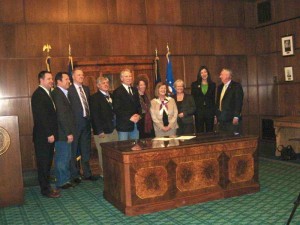On Wednesday, April 11, Governor Kitzhaber signed into law SB 1552, which provides homeowners facing foreclosure with new tools. This monumental legislation will address the  overwhelming tide of foreclosures and financial insecurity which has been threatening to permanently undermine the foundations of our state.
overwhelming tide of foreclosures and financial insecurity which has been threatening to permanently undermine the foundations of our state.
The legislation is just the first step – from April 11, we have ninety-one days to implement the law and re-imagine the current system to best make all these pieces work together for the benefit of homeowners and Oregon communities. While the task is large, the Housing Alliance and advocates are confident we can do it and that we can make it work well for homeowners.
To help inform our partners and move us forward, the Housing Alliance will be sending out periodic email updates, in addition to convening regular meetings. Please feel free to share our email updates about progress on implementation, or contact us with questions.
Today, too many Oregonians are facing the uncertainty of foreclosure or of owing more on their home than it’s worth. One in five is underwater, while one in eleven is either in default or is 30 days late on their mortgage payments. The law being put into effect by SB 1552 plus funds from the national Attorneys General settlement will make a huge positive impact for these homeowners. The law will provide access to accurate information and will help equip homeowners to make good decisions about their future. Together, the policy changes plus the monetary resources will create a complete system to protect homeowners from bad practices, give them access to needed resources, information, and assistance, and stop allowing foreclosures to wreak havoc on our economy.
What will the law do? The basics are that it gives homeowners facing foreclosure the right to mediation, access to better information and protection from “dual track” processing. Here are some more details:
- Mediation: The law requires lenders to meet with homeowners who are underwater or in default with a third party mediator. For homeowners who are underwater, it must be upon the borrower’s request. For homeowners in default, lenders must mediate with borrowers prior to starting the foreclosure process unless the borrower chooses to opt out of the process.
- Authority to Negotiate: At mediation, banks must send someone to mediation who has the authority to accept or reject proposals for foreclosure avoidance.
- Lenders and borrowers will share cost for mediation, with borrowers’ costs being capped at $200 and waived if needed.
- Mediators must issue a certificate of compliance to the bank before they can proceed with a foreclosure filing.
- Counseling: The law requires that homeowners need to receive housing counseling prior to proceeding with mediation. The law does provide an exemption in cases where a homeowner can’t get an appointment with a counselor within thirty days.
- Advanced Notification Rules: The law sets up timelines for notices of mediation, sale, and foreclosure. Lenders must follow these timelines to legally foreclose on a homeowner. It also provides rules for proper notice for homeowners about sale dates.
- Ends dual-track processes: The law prohibits all lenders from “dual tracking” homeowners – renegotiating loan terms while also pursuing foreclosure.
Those are the basics of the law. You can read more here.
So now what? Advocates are working to help implement this law in a way that envisions a whole system and uses national Attorneys General settlement dollars to fill gaps in our current system. The goal is to have the system as up to speed as possible by the effective date of the law, July 12, 2012.
We are working hard to ensure all homeowners will be able to access the information and resources they need, when they need it. This system could include:
- Coordinated, strategic outreach to homeowners to inform them about their options and help them access the services they need.
- Counseling to homeowners through certified foreclosure counselors. This could start as a group session in which homeowners learn more about the basics of foreclosure and their rights and responsibilities. From there, it could expand to include one on one counseling sessions and assistance preparing for mediation.
- Mediation with their lender and a neutral third party mediator. The law guarantees access to mediation unless the borrower waives it. We’re working to create a system to help homeowners understand what mediation is and its benefits, and to help them access it smoothly and in a timely fashion. Mediation can help homeowners understand and realize their options – whether that’s staying in their home, selling through a short-sale, or another option that best meets their needs.
- Legal assistance for homeowners with lower incomes who need legal advice for more complicated circumstances.
- Connecting homeowners to other available assistance programs, and onngoing evaluation about what is working for Oregon homeowners and communities
The new foreclosure law has the potential to positively impact thousands of homeowners across Oregon, and help stop the negative effects of foreclosure on our communities, our economy, and our state. Together, we can create a system that fully utilizes the policy changes and settlement dollars to benefit homeowners in need of assistance.
